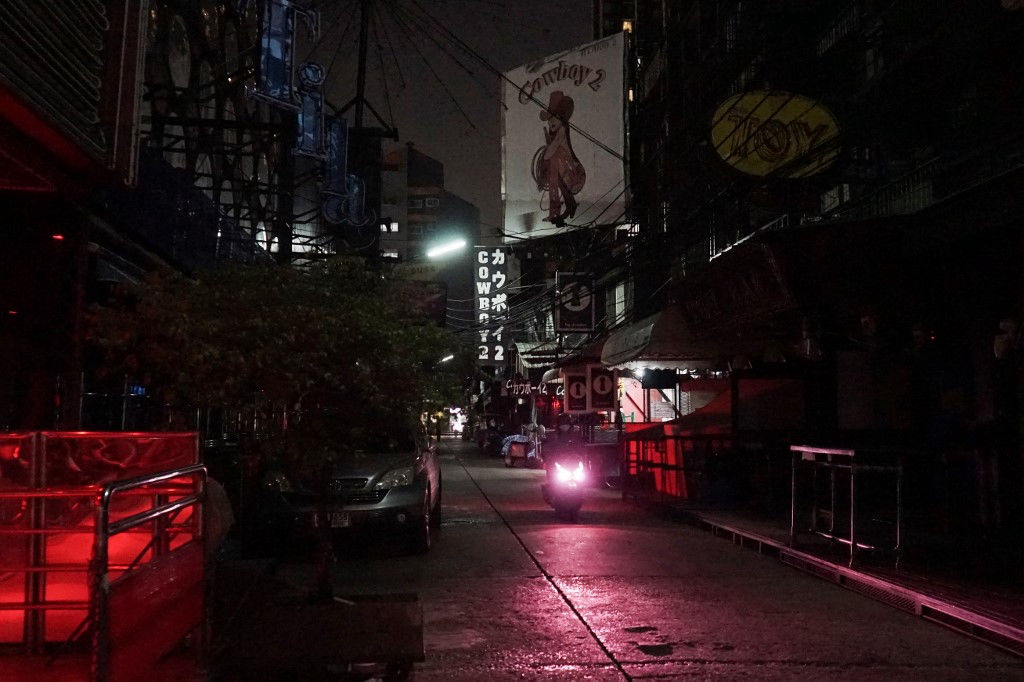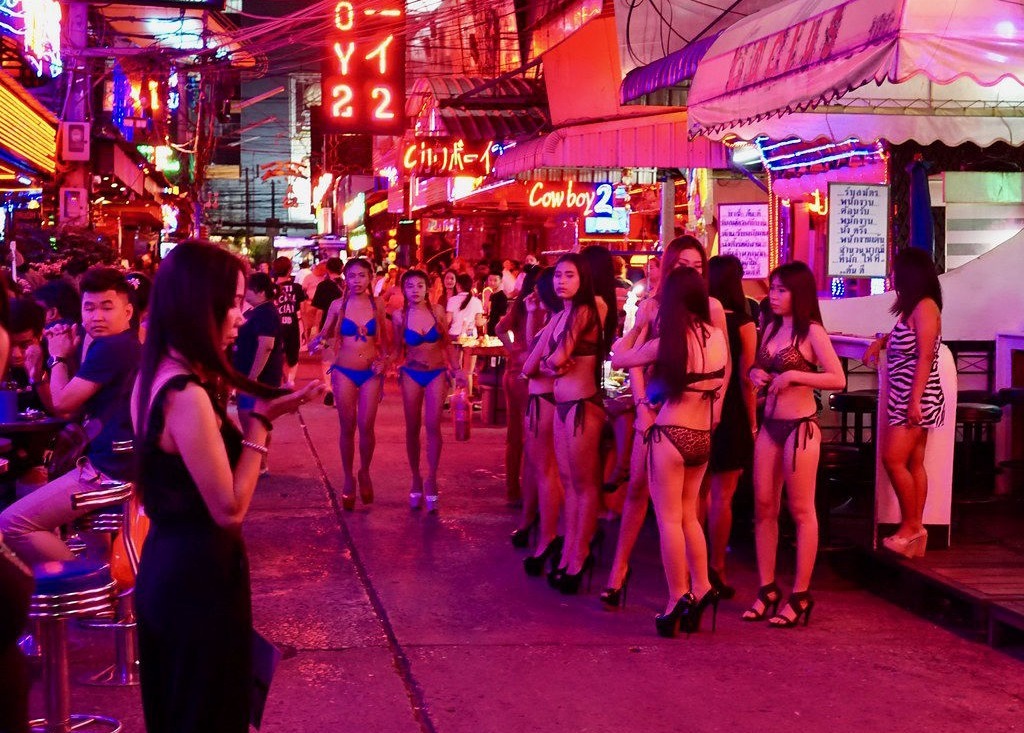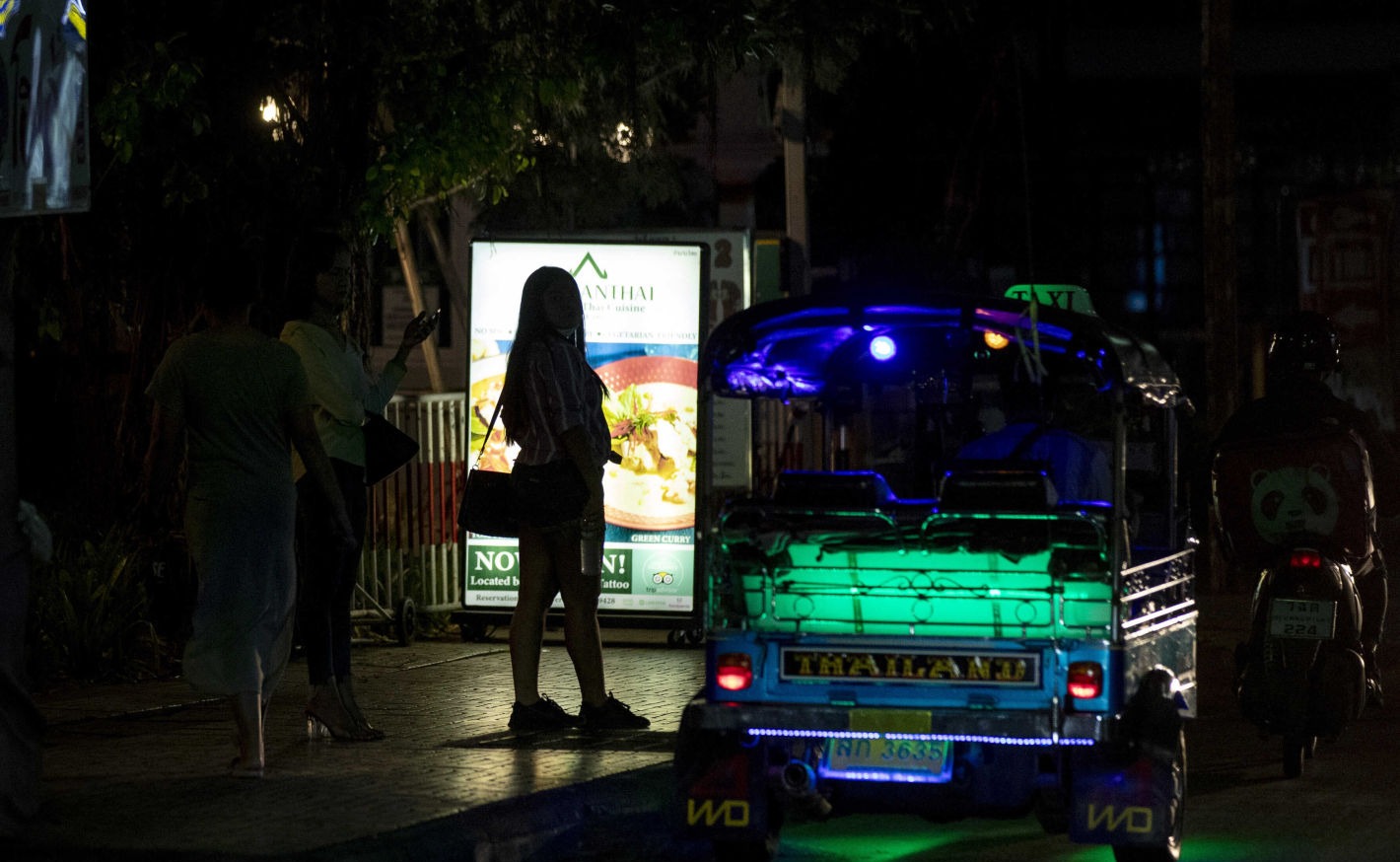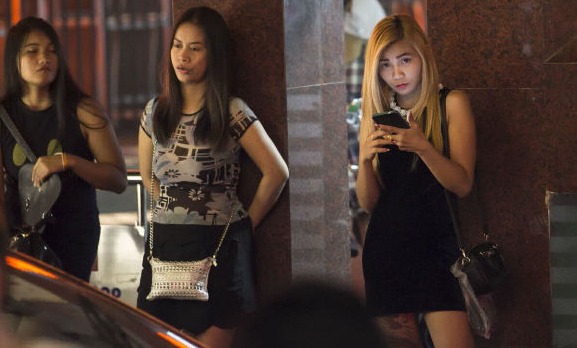
NO JOB, NO COMPENSATION: SEX WORKERS SUFFER UNDER COVID SHUTDOWN
THAILANDS MOST VULNERABLE
Over the years, Thailand has gained a reputation among travellers from many countries for its sex tourism.
According to Empower Foundation, an organisation advocating for the rights of sex workers across Thailand, entertainment zones earn around US$6.4 billion a year in revenue and sex workers create roughly four to 10 percent of the kingdom’s gross domestic product (GDP).
It was reported that sex workers can earn up to BHT5,000 (US$150) a night – nearly 20 times the minimum wage in Thailand of BHT300 (US$9) a day. The primary tourist ‘adult entertainment zones’ of Thailand are often identified as the red-light districts of Bangkok and Pattaya, Koh Samui as well as Patong Beach on Phuket Island. According to media reports, the city of Pattaya alone in Chonburi Province has around 27,000 working girls.

Above; sex workers line the streets on Beach Road Pattaya
Despite the popularity of the sex industry in Thailand, prostitution has been illegal in the kingdom since the 1960s.
Any person, being over 16 years of age, subsists on the earning of a prostitute, even if it is some part of her income, shall be punished with imprisonment of seven to 20 years and fined of 14 thousand to 40 thousand Baht, or imprisonment for life,” according to Thailand’s Penal Code Amendment Act.
Nevertheless, although authorities in Thailand have implemented laws against sex work and conducted numerous crackdowns at clubs and karaoke bars – the industry has continued to thrive.
That is, until the COVID-19 virus hit the country, which has been devastating.
On 26 March, a state of emergency came into force in Thailand with the hope that it would help break the chain of infection. It was reported that entry into the kingdom was barred except for diplomats and returning Thais with health certificates.
Later it was fformaly announced that authorities would also "close all checkpoints and gates" for its land borders, while entry by air and ship would also be halted. Other than that, mass gatherings were also prohibited during the state of emergency, which was to end on 30 April.
The strict measure is a blow for Thailand’s tourism industry, one of the country’s main economic sectors.
Thailand anticipates the loss of five million tourists this year, taking with them "250 billion baht (over US$8 billion) in revenue", according to Don Nakornthab, Director of Economic Policy at the Bank of Thailand.
Moreover, according to media reports, Thailand also implemented a night curfew in a bid to control the spread of the coronavirus. The curfew began on 3 April, from 10pm to 4am daily and forbids anyone in the country from leaving their homes. Authorities also warned that those who violate the order will face a two-year jail term. Foreigners would face a 40,000 baht fine , two years in prison and deportation.

Above; Soi Cowboy Bangkok post-pandemic
WALKING THE STREETS
The state of emergency in Thailand has shuttered the country’s party scene and has left an estimated 300,000 sex workers out of work.
Night clubs and massage parlours in the kingdom’s red-light districts have also been required to suspend business. Some sex workers have had no choice but to walk the streets in order to find customers – potentially exposing themselves to the virus, Human traffiking , abuse, as well as risking getting caught by the police.

Above: Former stars of go-go bars, hostesses and bar girls line the streets along Sukhomvit Rd.
Up until now Thailand for the most part had brought the worst elements of the sex trade – human trafficking, child exploitation, the spread of STDs – under control, decent jobs are not easy to find, especially for the unskilled.
Pim, a sex worker and former coyote dancer told the media. "I'm afraid of the virus but I need to find customers so I can pay for my room and food,"
"We're more afraid of having nothing to eat than the virus," says Noy.
“We are doing this because we're poor. If we can't pay for our room, they will kick us out," Da explained to reporters.

Above; Soi Cowboy Bangkok pre-pandemic.
THE STIMULOUS PACKAGE THAILAND
Thailand passed a BHT1.9 trillion (US$58 billion) stimulus package. The Thai Cabinet also rolled out a package of measures to assist workers, employees and independent professionals, small enterprises and other businesses affected by the pandemic, based on local media reports.
Nevertheless, concerns were raised by organisations and sex workers that a Thai government emergency scheme to give BHT5,000 (US$150) to newly jobless citizens would exclude sex workers as they were unable to prove formal employment. .
Many are mothers and main family providers and carers . Due to COVID-19, the government has ordered closures of entertainment venues which means that over 100,000 sex workers across Thailand are out of a job.
In emergencies women are often the ones who do the work of caring for others. Yet this work is not recognised, nor compensated or supported.”
Reacting to the issue of the emergency scheme, Noy told the media that “They (the government) don't care about people like us who work in the sex industry."

The stimulus package is an effort to revive an economy battered by coronavirus, which has brought tourism to a standstill, slashed exports and left millions jobless.
Tourism revenues dropped by 40 percent in the first quarter, the Thai PM said, and the next quarter will be even "more severe".
So far, more than 20 million have registered for a government handout of THB5,000 (US$150), while many others say they have been left out of the scheme.

SUICIDE
A Report says Thailand’s suicide rate increasing during coronavirus pandemic.
Driven to desperation by the unprecedented economic impacts of the COVID-19 pandemic the number of Thais taking their own lives to escape their hardship has increased, according to a research paper commissioned by the Office of the Committee for the Promotion of Science, Research and Innovations.
The research was conducted by a group of academics from Chiang Mai, Chulalongkorn, Thammasat, Thaksin, Khon Kaen and Burapha universities, based on press reports published during the first three weeks of April, during which the national lockdown measures were in place.
The report says that there were 38 suicide attempts during that period, resulting in 28 deaths, adding that, while the lockdown has been somewhat successful in slowing the rate of new COVID-19 infections and deaths, it has also had a devastating impact on the economy.
It accused the Government for not being well enough prepared and slow to come up with remedial measures to cushion the impacts on the people, especially ordinary workers, freelancers and the urban poor, who were caught unaware, blaming the bungled 5,000 baht/month stimulous scheme for driving some people to kill themselves.
MENZZOO MAGAZINE
June 2020